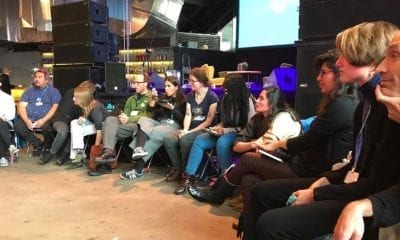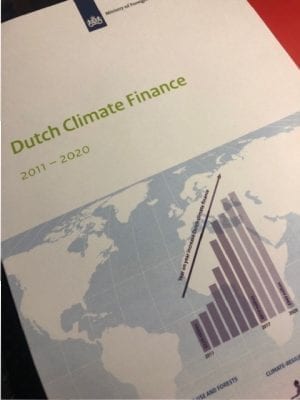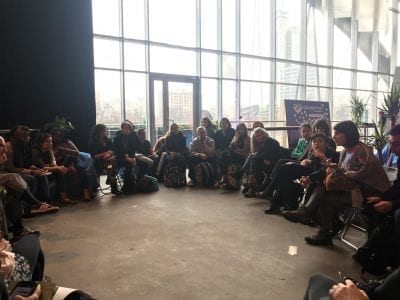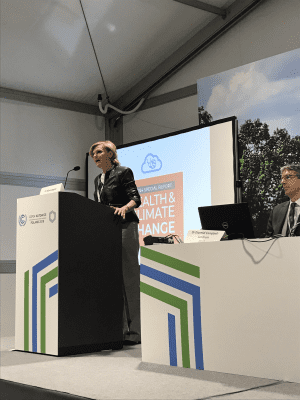Editors note: Our COP fellows were quick to realize the importance of economics when it comes to solving global issues. Climate change is expected to impose an economic burden on every country, and unfortunately, some will be unable to cope. The following blogs discuss the economic complexities of climate change.
Economics and Climate Justice – Frank Griggs
Financing a Greener Future – Jessica Weaver
Are we changing? Yes. Can we change? Can we listen? – Risa Lewis
Blazing the Trail Toward Renewables – Jon Ursillo
Capitalism and Climate Justice
Frank Griggs – Ph.D, Political Science

The most thought-provoking aspect of my first day at COP 24 related to a discussion that was organized and facilitated by climate justice activists. This was fortuitous for me. I was eager to speak with activists who are associated with a movement that I’ve been studying and have an affinity for. Climate justice primarily refers to a heightened concern for marginalized people who are experiencing the most severe burdens associated with climate change, and an orientation, ranging from criticism to rejection, of climate change policies that entail market-based or capitalist approaches (e.g. cap and trade, carbon tax).

Some climate justice activists entirely reject the United Nations’ climate change governance efforts, viewing it as a disingenuous pretense to address climate change, one that is foremost intended to preserve and promote the exploitation of market-capitalism. This has puzzled me for years. For those climate justice activists who reject market-capitalist systems, what alterative policies or political economic arrangements do they advance to address climate change? I argue that addressing climate change should be a multi-faceted global endeavor, one involving science-based research, politics, economics and cultural factors, and including some form of carbon pricing. I further believe that any carbon pricing regime will be subject to manipulation, but it’s a situation that calls for continual assessment and reform rather than complete rejection.
I joined a discussion that was in session upon entering the climate hub. At a seemingly opportune moment, I asked the facilitators-climate justice activists about their thoughts on cap and trade. The interaction did not go well. My question prompted eye-rolls and scorn from both facilitators. I tried to salvage the interaction by conveying a sincere desire to better understand them but was unsuccessful.

I initially felt puzzled, frustrated, and insecure by the interaction, but my first day at COP 24 was a positive learning experience. The activists provided insights regarding my questions – the two activists I met stated that they reject capitalism but offered little suggestion regarding alternatives. Also, it’s tempting to point a finger, but important to consider how I may have contributed to the awkward interaction. I joined the discussion while in session and missed the introduction and directions; I’m not trained in interview methods, and possibly failed to ask my questions in a more tactful manner; also relevant, the facilitators at least twice mentioned being “exhausted” from offering explanations to “patriarchy…[from the] global North,” a sentiment that seems understandable in light of their probable life experiences. Based on reflection and input from others, the activists and I had topically related but differing objectives – they likely sought expression while I was focused on policy.
Financing a Greener Future
Jessica Weaver – Senior, B.S. Political Science

During my time at the COP24 Conference I had the opportunity to sit in on a few presentations regarding green finance. As a student with minors in human rights and business, I am particularly interested in how the private sector plays a role in tackling climate change.
At the COP, the Netherlands pledged €100 million ($125m) to the Green Climate Fund (a fund created by the UNFCC focused on funding climate change issues), while other nations like Germany and Great Britain expressed great support for green finance options. While at the Netherlands pavilion, there were a multitude of presentations regarding climate finance options in their nations. In one particular presentation, there were discussions by various companies that advocated for innovative ways to monetize climate change solutions. Some explained the growing field of smart houses that use energy efficient materials, while others were much more obscure, including a dating app that paired environmental “wasters” and “savers” together.
Investment in climate change solutions has become a large part of the conversations, because without the actual monies going towards addressing climate change issues, there is no way progress could be made. There was a great presence of both multi-governmental funds like the Green Climate Fund, as well as private corporate funds focused on reducing greenhouse gas emissions, and investing in energy efficient infrastructure as well as carbon reduction practices.
I was grateful to be able to see such a large presence of these funds, and left the COP hopeful that there were multiple parties in multiple sectors that see climate change as a good place to put their money. In the end, the onus for climate change solutions is not just on governments, it falls on the private sector as well to contribute to reducing climate change impacts. Climate change solutions cannot happen without governments, companies, and people investing their time and dollars into creating change.
Are we changing? Yes. Can we change? Can we listen?
Risa Lewis – Junior, B.S. Agricultural and Resource Economics
Heading to the COP24, I was hoping to find new ideas and insights within the field of environmental economics and policy, but I realize now I had subconsciously put my expectations for those new ideas within the familiar frameworks of thought and governance I was comfortable with. As a result, the most meaningful parts of my experience at the UN’s Climate Summit in Poland have been interactions and conversations with people with rather different perspectives from my own.

During a Climate Hub workshop entitled, “Women for Climate Justice: Local Struggles, Global Actions,” we were led through a meditative contemplation and drawing of the “territory of our bodies.” To invoke contemplation, the facilitator asked us how and where we felt the impacts of climate change and its potential solutions, including poverty, water scarcity, renewable energy, collective action, and ‘extractivism’ (the first time I had encountered the term).
As an example, the leader of our guided contemplation shared “market solutions” as something that greatly troubles her. Market solutions make up a significant portion of what I have been studying thus far (with a large exception perhaps being independent study of behavioral economics). Naturally, her statement prompted me to take a renewed look at the conflicting ideologies about the best ways to combat climate change. This a conflict I have examined more closely this semester through the juxtapositions of my resource economics classes and an English class on the history and human experience of capitalism.
The most rewarding part of the COP so far was putting these thoughts into active conversation. Being a young student of environmental economics and policy, I often find myself shying away from conversations because I feel I don’t have the confident perspective and experience necessary to provide valuable contributions. But just as the uncertainty surrounding climate change cannot be a reason for inaction (a point reinforced by Linda Mearns, senior climate scientist for the IPCC and NCAR, who shared how we make decisions in the face of uncertainty every day as a guest speaker at the UConn@COP “breakfast club” discussion), insufficient knowledge cannot be a reason to avoid conversation—at the very least, it may inspire greater self-education.
I found an opportunity to discuss these very ideas with a fellow workshop participant from Portugal on the bus ride back from the COP24 venue to Krakow. Like many in the climate change field, he came from a perspective that sees capitalist ideas as inherently incompatible with combatting climate change. He believes that placing monetary values on the environment is unrealistic, and over-simplifies solutions to the climate problem. I’m not sure yet where I stand exactly on these issues but we definitely disagreed in many ways. We challenged each other’s logic and understanding of different societal and economic systems. In fact, I was so distracted by this engaging conversation that I left my passport behind on the bus! (However, there was a happy ending as I was able to retrieve my passport and other belongings – Polish bus dispatchers and the COP24 volunteers are incredibly compassionate). The complexity of the conversation only reinforced my belief that the solution is far from simple.
But people like my Portuguese friend have a point. A common idea expressed (often with exasperation) by speakers and observers alike at the COP24 conference is that this is COP…24. It has been 24 years since the first UNFCCC conference to collectively take action against climate change and, despite a recent period of stable emissions, they have begun to rise again, as has the movement of climate change denial. And so it is rather eye-opening how it required my visit to the heart of the global climate change debate to see, firsthand, the stagnation we are so desperately trying to break free from, before it’s too late. I have a greater appreciation now for the value of organized social movements and civic unrest such as that of Extinction Rebellion, a global movement represented at the Climate Hub.

With the normal avenues of change proving as yet to be too slow, being at the COP forces me to recognize the importance of this type of protest and action towards changing human behavior. As someone interested in studying human behavior from an economic standpoint, I tend to focus on questioning the efficacy of change-making mechanisms, like organized protests, in altering policy and actually impacting society. But this perspective is, in and of itself, an expression of aversion to change and reliance on traditional systems of progress. Therefore, even though I still am deeply interested in environmental economic policy research, I recognize the way in which a desire for climate action can be communicated much more effectively outside government systems, and I will put this recognition to use in my plans for future environmental economic research.
At the very least, conversations between people of conflicting ideological social circles are necessary—and most of society agrees on this—but the question of how to have conversations that are more than “sounding boards” remains. Many of the Climate Hub workshops I attended on feminism and intersectionality in climate change never surpassed a shallow level of sharing to the deeper level of give and take that I had hoped to experience. As one participant lamented in the wrap-up, the conversation remained distant.
But I found that the “territory of our bodies” workshop proved the most productive in inspiring conversation and sharing by providing a common ground of others’ often similar interpretations of the personal impacts of climate change. Just as behavioral economics works to better represent the often-flawed nature of humanity, sharing personal stories from a starting point of some common perspective appears to be a vital part of the shift towards actively reducing the effects of climate change.
Blazing the Trail Toward Renewables
Jon Ursillo – Junior, B.S. Environmental Science and Economics

A central theme to the COP24 UN Climate Change Conference was the need to switch from a fossil fuel-based economy to one grounded in renewable energy. For instance, in the photo above, Dr. Maria Neira, Director of Public Health, Environmental Health, and Social Determinants of Health for the World Health Organization, is imploring for the need to switch to renewables, citing that the health costs saved from mitigating climate change will be double the cost of actually mitigating climate change itself. There are many critics of renewables, however. These opponents insist that renewable energy is too expensive, relying on hefty government subsidies to be viable. Moreover, they argue that renewables are not reliable given variations in weather between locations and even at a specific location.
COP24 showed that great strides are being made to thwart these criticisms. The cost of renewable energy is plummeting faster than anyone predicted. New solar energy is already cheaper than building new gas plants with projections for new renewable energy to be cheaper than existing fossil fuel plants in nearly every country by the mid-2020s. This renders the cost-effectiveness argument against renewable energy invalid.
Additionally, Dr. Iain Staffell from Imperial College London helped address the issue of variability in weather between regions. He created a tool called the “Renewables Ninja.” The Renewables Ninja is an interactive map showing the potential of solar and wind energy across the world. It is free to the public and helps individuals and businesses choose the optimal renewable energy option for their location. The public availability of this information is an immense breakthrough toward the adoption of renewables on a global scale.
Finally, Danielle de la Cour, Senior Project Manager for The Ecompany, is taking on the issue of reliability of renewable energy. The Ecompany provides a marketplace for private industry to secure contracts with renewable energy producers, working to facilitate the matchmaking process based upon the needs of each client. These contracts that lock in price and production level are extremely valuable to both the producer and the business purchasing the energy. The buyer wants to fix its costs and secure a guaranteed energy supply for the stability of its operations, and the producer can utilize the contract as leverage to convince banks to finance expansion given the guaranteed income that would come from the increased production capacity. Further, this marketplace eliminates the need for traditional energy brokers, which Danielle described as expensive and inefficient. The Ecompany eventually plans to integrate AI to help companies find the ideal energy plan to meet their individual needs.
The Ecompany and Renewables Ninja highlight the progress being made toward disruptive change in the energy sector, providing hope that the vision of Dr. Maria Neira and other climate activists can one day be actualized.